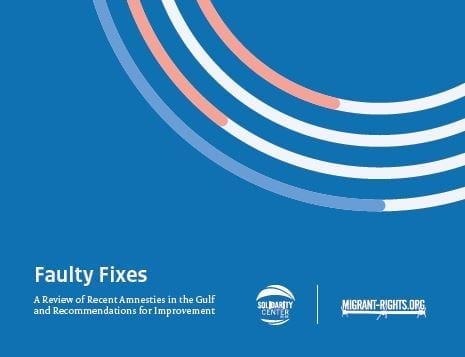
Mar 28, 2019
In Gulf Cooperation Council countries—Bahrain, Kuwait, Oman, Qatar, Saudi Arabia and the United Arab Emirates—amnesties for workers in irregular status are frequently declared, indicating that irregularity is a common and recurring phenomenon within the governing kefala, or work-sponsorship, system. However, even if implemented perfectly, amnesty is a temporary fix, and effective solutions to reduce the population of undocumented migrant workers requires adherence to labor rights principles, according to a new report by the Solidarity Center and Migrant-Rights.org.
The GCC countries are characterized by a majority migrant workforce, tied to their employer-sponsors through kefala. However, for workers whose sponsors fail to renew work visas or for workers who are duped by fake jobs in the recruitment process or who land in untenable and abusive situations, workers “face a series of narrow, unenviable choices and are systematically denied freedoms enshrined in international human rights law,” says the report, Faulty Fixes: A Review of Recent Amnesties in the Gulf and Recommendations for Improvement.
In fact, the report adds: “Migrant workers who are unable to legally leave their job, or leave the country in some cases, are vulnerable to a range of abuses including occupational safety and health violations and gender-based violence as well as non-payment of wages and other forms of forced labor.”
The report has a variety of recommendations for countries of origin and Gulf nations to improve working conditions for migrant workers and to minimize factors that push them into irregular status. Among them: planning and communicating about an amnesty with migrant worker embassies and communities; investigate absent or abusive sponsors; and informing workers about their rights.
See the full report in English and Arabic.
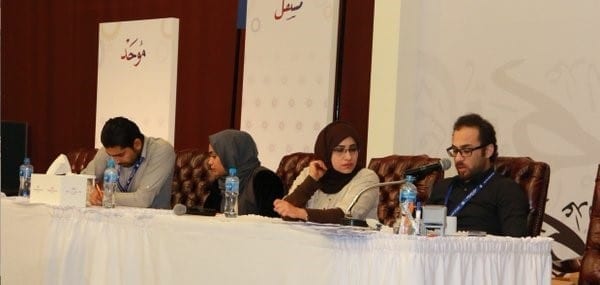
Mar 16, 2016
Even as trade union representatives from Tunisia and other trade unionists were barred from entering Bahrain to attend the General Federation of Bahrain Trade Unions (GFBTU) Congress, hundreds of union members participated in open, spirited discussions and held free elections, capped by the secretary-general’s call for continuing the democratic process.
“It is time for the democracy you and I believe in, and are called to implement, to take its course—the democracy that we have made a symbol and principle,” said GFBTU General Secretary Sayed Salman Al-Mahfood.
Mahfood, who stepped down along with three leaders who helped found the federation in 2004, said democracy means “leaving while enjoying the capacity to give.”
Four women are among the 15 newly elected members of GFBTU’s secretariat.
The democratic elections took place in a difficult environment. Just this week, Bahraini human rights activist Zainab Al Khawaja was arrested, along with her 15-month-old son, Abdul-Hadi. The arrest follows the fifth anniversary of pro-democracy uprising in February 2011.
Although Bahrain still lacks democratic practices, GFBTU has presented an alternative with its March 5-7 Congress as an example.
“What I saw was a living example of democratic practices that included thousands of workers in Bahrain,” says Nader Tadros, Solidarity Center Regional Program Director for the Middle East and North Africa.
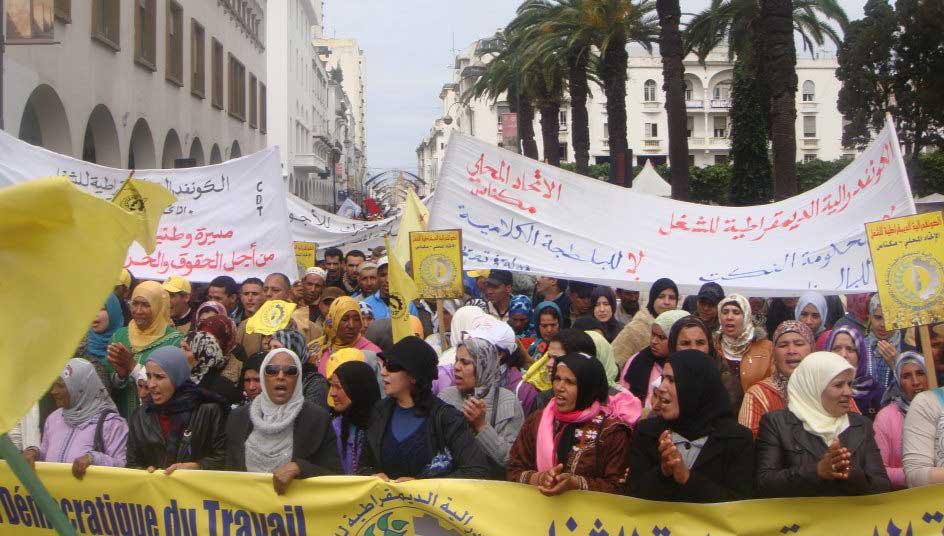
May 1, 2015
Workers in Bahrain, Burundi, Morocco, Swaziland and Turkey are standing strong in the face of economic and political threats this May Day.
May 1 is generally a time when workers around the world celebrate the dignity of work and working people’s social and economic achievements. But this year, governments in some countries have banned May Day celebrations, while elsewhere, workers are forced to protest lack of progress in attaining their share of economic prosperity.
Working women and men are undaunted by intimidation and, in some cases, risking their lives to exercise their freedom to gather in the public space and stand up for their rights. This year more than ever, May Day stands as a beacon for internationally recognized human and labor rights. Here’s a roundup.
Bahrain: The government on April 30 banned all May 1 rallies, forcing the General Federation of Bahrain Trade Unions (GFBTU) to abruptly cancel its weekend celebrations. The federation had planned a rally, medical camps, family outings and award ceremonies focusing on the rights of women and migrant workers in the workplace. Thousands were expected to attend the rally, including members of more than 45 GFBTU-affiliated trade unions.
Burundi: Hundreds of journalists and human rights activists have been arrested and Internet has been inaccessible in the capital, Bujumbura, in recent days following protests against the re-election bid of President Pierre Nkurunziza. Some journalists have been “beaten up and workplaces forced to close down,” one journalist told allAfrica. Civil society organizations and political movements have been denied the right to hold public meetings and assemblies. The Confédération Syndicale du Burundi (COSYBU) and the Organization of Free Unions of Burundi (CSB) cancelled May 1 festivities because of the country’s insecurity.
Morocco: The Moroccan union movement is boycotting May 1 celebrations and instead turning May into a month of protest. The Moroccan Labor Union (Union Marocaine de Travail), the Democratic Confederation for Labor (Confédération Démocratique du Travail) and the Democratic Federation for Labor (Fédération Démocratique du Travail) and others will protest the lack of movement in improving civil servants’ salaries, increasing the minimum wage and boosting minimum pension, per an agreement with the government in April 2011.
Swaziland: Despite a ban on May Day rallies, the Trade Union Congress of Swaziland (TUCOSWA) is encouraging members to turn out and “celebrate their day and not be prevented by actions that are at best unlawful.” Police announced that only “recognized unions” will be allowed to mark May Day. The authorities have refused to recognize TUCOSWA, and police have repeatedly broken up TUCOSWA meetings this year, injuring at least one union leader. “Our members are geared for their celebrations and will not be prevented by threats from the police,” says TUCOSWA Secretary-General Vincent Ncongwane.
Some Swazi pro-democracy activists and trade unionists have been imprisoned. Sign a LaborStart petition demanding their release. If you Tweet, use the hashtag #SwaziJustice.
Turkey: After hundreds of workers defied a ban on May Day rallies in Istanbul, riot police fired tear gas and water cannon on protestors in the city’s central Taksim Square. Unions had called on the government to lift its ban on “illegal demonstrations,” in Taksim. Much of Istanbul’s public transport is shut down and police helicopters are circling over the city.
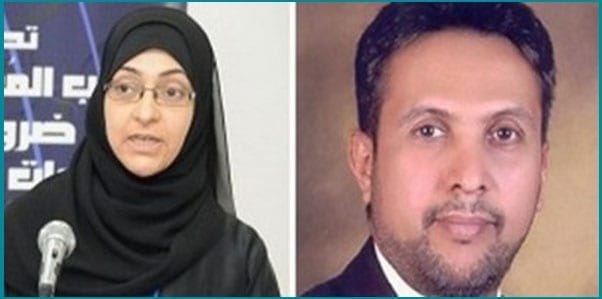
Feb 20, 2015
Leaders of the Bahrain Teachers Association were awarded the 2015 Arthur Svensson Prize for Trade Union Rights this week. The international honor recognizes Mahdi Abu Dheeb and Jalila al-Salman for “their encouragement of strike actions among teachers despite the personal risks they faced, including imprisonment and torture.”
Abu Dheeb, association president, was arrested in 2011 and sentenced to five years in prison. Charges against him included calling for a teachers’ strike. His health is deteriorating, and he is not receiving essential medical aid, according to the foundation.
Al-Salman, now acting union president, was arrested three times for exercising her right to freedom of assembly, for demanding reforms in Bahrain’s educational system and for protesting the killing and suppression of protesters, many of whom were students. Since her release from prison in November 2012, she has been banned from employment and her freedom of speech is restricted.
The Svensson Prize, established by the Norwegian union, Industri Energi, in 2010, is awarded annually to a person or organization that has worked predominately to promote trade union rights and/or strengthen trade union organizations. The announcement occurred as activists and unions around the world participated in a global day of action to support the right to strike.
Napoléon Gómez Urrutia, general secretary of Los Mineros, the National Miners’ and Metalworkers’ Union of Mexico (SNTMMSRM) received the prize in 2014, and Valentin Urusov, the Russian electrician and trade unionist unjustly imprisoned for years in a Siberian penal colony, received it in 2013.
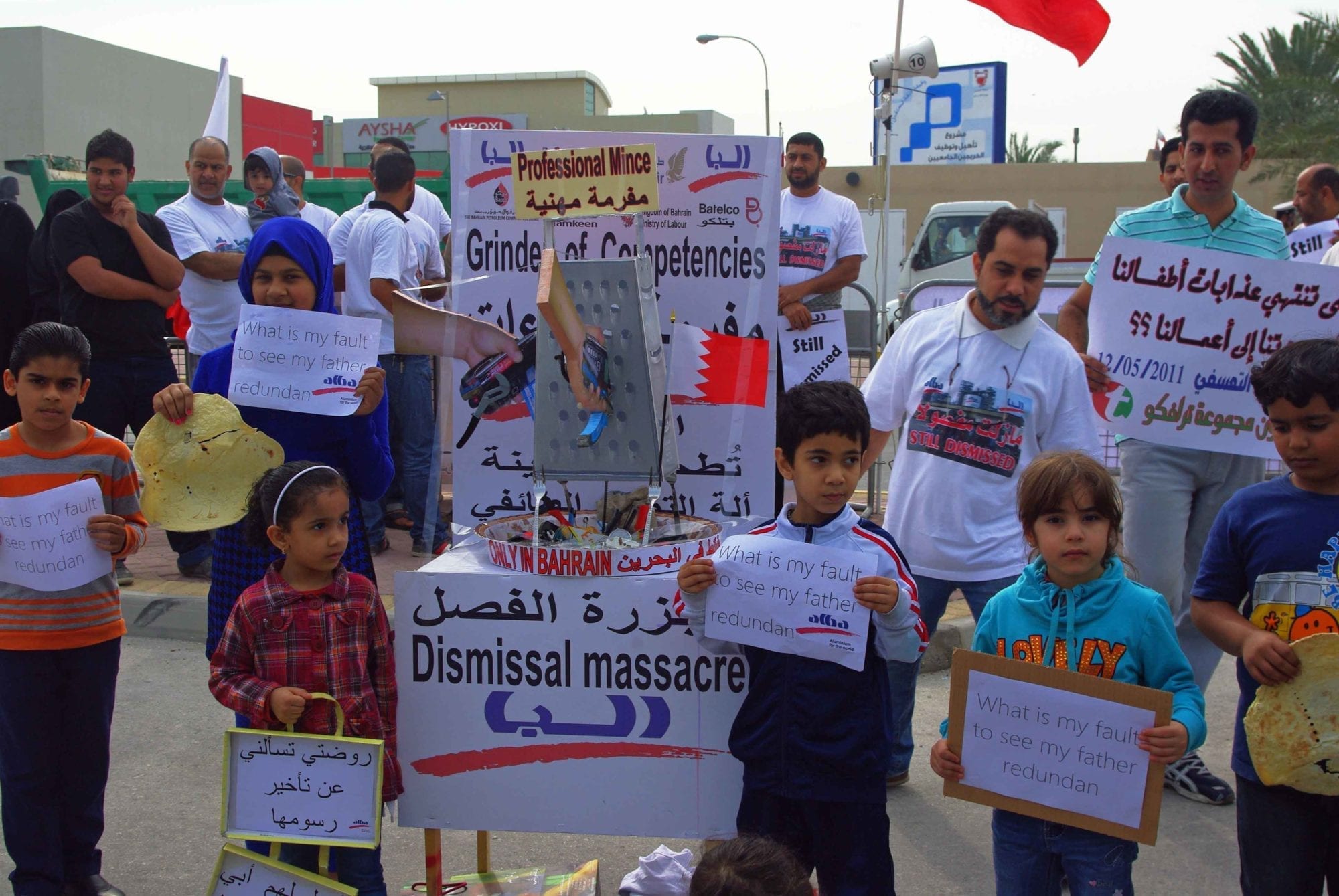
Feb 13, 2015
The Bahrain government continues to torture opponents, penalize union members and leaders, and suppress human rights four years after the people of Bahrain stood up for a more participatory government, says Mohammed Al-Tajer, general coordinator of the Bahrain Human Rights Observatory and a human rights lawyer.
In fact, he says, “the situation has worsened. Security police are everywhere, military police are everywhere. Bahrain is a totally militarized place.” Al-Tajer spoke today with the Solidarity Center in Washington, D.C., where his visit coincides with the anniversary of protests for greater political freedom in the Gulf kingdom, which launched February 14, 2011.
Al-Tajer, who has represented hundreds of workers and political activists since the government crackdown began in 2011, was arrested that year and held without access to lawyers or his family for more than three months. When he was brought to trial, he faced charges that included publicly inciting hatred against the government and spreading malicious news and propaganda. He was convicted but released based on time served.
His high international profile—the United Nations decried his treatment by the government—has so far enabled him to continue his work without arrest.
Since 2011, Al-Tajer says 166 people have been killed and thousands are still in jail, many of whom are teachers, doctors, nurses and journalists. Union leaders have been especially targeted. Some of have been jailed, others have been fired, or given dead-end jobs and 4,500 union members have been fired for participating in the 2011 actions, Al-Tajer says. Banning workers from certain jobs, a tactic for repressing dissent, continues: Al-Tajer says he sees several new cases a week as workers seek to appeal their dismissals.
“Anybody who Tweets, anybody who speaks about freedom, about labor rights, might go to jail, might lose his job,” he says, adding that anyone who calls for a strike is jailed.
In 2013, the government issued restrictive anti-terrorism laws that ban all protests and public gatherings and stipulate that parents could be jailed if their children repeatedly participate in demonstrations. Amnesty International characterized the laws as “a further shameful attempt to completely ban any form of dissent and freedom of expression in the country.”
Most recently, Bahrain has been stripping citizenship from activists and others who express dissent, including 72 people last week, and Al-Tajer says the government preparing to issue a new set of harsh decrees.
Ali Abdulemam, a Bahraini human rights activist, was among them. Writing at Foreign Policy, Abdulemam says:
“This latest step by the Bahraini monarchy is the culmination of a decade-long effort to stifle me and others who oppose its rule. I have been jailed twice, subjected to torture, and fired from my job due to my activism. I was regularly harassed by pro-government thugs, and spent two years of my life in hiding. As if all that is not enough, the authorities have now branded me with the title ‘stateless.’”
As Al-Tajer says, repression in Bahrain is so widespread that “No single family has not been affected in Bahrain.”





